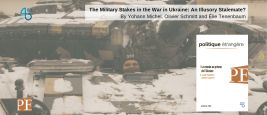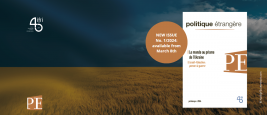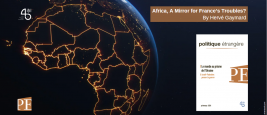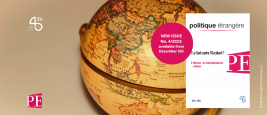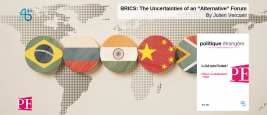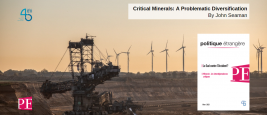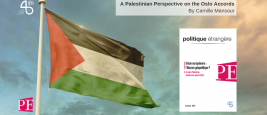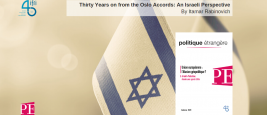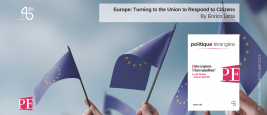The Ukrainian counter-offensive, which was supposed to result in a major breakthrough in 2023, came up against solid Russian defenses and ended in failure.

Publications
With over 150 publications issued each year
under an open access policy in French, English, German and Russian,
Ifri enriches the international debate with a constant concern for
objectivity, intellectual rigor, transversality, openness, and support to public and private decision-making.
Politique étrangère is a journal of debate and analysis of major international issues. It is the oldest French journal in this field. The first edition dates back to 1936 under the aegis of Centre d’études de politique étrangère (Centre for the Study of Foreign Policy). Since 1979, it has been edited by Ifri.
Its purpose is to highlight all aspects of the ongoing debates in international relations, to put forward an in-depth analysis of current affairs and to be a stable reference tool for academic circles, decision-makers and the civil society. Each issue includes at least two sections related to an event or a specific dimension of international debate as well as several articles focusing on deciphering topical issues.
In Politique étrangère, much space is devoted to current affairs in international relations that are developed both in French and foreign publications.
This issue of Politique étrangère looks at three conflicts currently unfolding around the world.
France's setbacks in the Sahel should not lead it to forget the long-standing historical ties that bind it to many African countries.
War in Ukraine: How Does the Russian Economy Stand? Politique étrangère, Vol. 88, No. 4, Winter 2023
The Russian economy is weathering the war and Western sanctions: it has maintained its exports, its business sector has shown marked dynamism, and the population is managing in part thanks to state spending.
In 2023, forums that amplify the voice of the “Global South” have proliferated and grown louder. As contradictory and divided as they may be, these forums (BRICS+, Shanghai Cooperation Organization (SCO), G20, the Group of 77, the European Silk Road Summit…) attest to the emergence of new...
Initially limited to the financial domain, the term BRICS is gradually becoming established in global economic governance.
Faced with the boom in demand for metal resources generated by the latest technology, the United States and Europe have been forced to revise the geography of their supply networks, which is synonymous with strategic dependency.
The Oslo Agreement of 1993 was a declaration of principles that later needed to be clarified through further negotiations.
The Oslo agreements signed in 1993 raised high hopes for peace in the Middle East. But appraising the state of affairs, thirty years on, the picture is bleak.
Europe: Turning to the Union to Respond to Citizens Politique étrangère, Vol. 88, No. 3, Autumn 2023
To deal with the internal and external challenges of a new era, the European Union must reform its institutions: review Member States' right of veto, strengthen the Commission, and take action on foreign policy and security matters, energy, the single market and the economy, social policy,...



